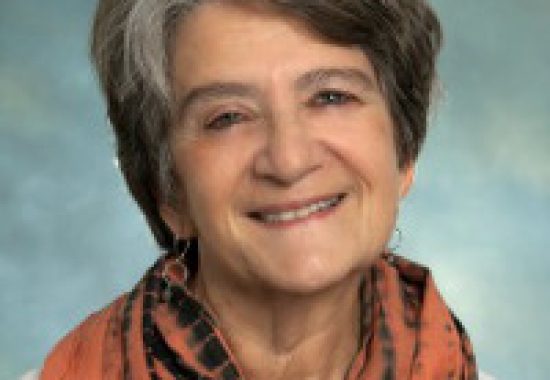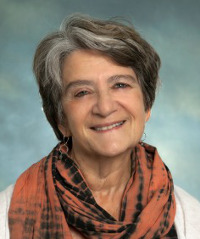Myrna F. Schwartz, PhD, is stepping down as associate director of the Moss Rehabilitation Research Institute, which she co-founded with MRRI director John Whyte, MD, PhD in 1992. But she’s not disappearing from MRRI completely: She’ll carry on her work in an emeritus role from California, where she’s moved to be closer to her family.
Schwartz is one of the most renowned language researchers in the country, and has devoted much of her career to studying and treating patients with aphasias and other language disorders. Her work has received funding from the National Institutes of Health (NIH) for over 30 consecutive years.
Laurel Buxbaum, PsyD., a research scientist at MRRI, has taken on the associate director role.
Schwartz earned her PhD in experimental psychology at the University of Pennsylvania. Over the course of her career she’s collaborated with and mentored some of the brightest minds in language and aphasia research. She has published over 90 peer-reviewed scientific articles, and has directly or indirectly helped diagnose and treat hundreds of patients recovering from stroke and other types of brain injury. Her work has sparked collaborations across disciplines not only at MRRI, but also with surrounding institutions, like the University of Pennsylvania and Temple University, and some even further afield.
“Myrna taught many of us how to really do research,” says professor of linguistics and psychology at the University of Illinois, Gary Dell, PhD, who’s collaborated with Schwartz extensively over the years. “She taught us how to ask key, central questions and not get sidetracked with the easy obvious stuff. She taught us to gather data in an unbiased way, and how to develop reliable measures in the face of chaos. She is simply the most skilled, dedicated, and creative researcher I know.”
Schwartz’ unique approach began to take shape in Dr. Oscar Marin’s lab at Johns Hopkins, where she did her post-doctoral work. Dr. Marin’s philosophy was at the time more akin to the British tradition than the American: Looking at individual patients with language and other cognitive disorders to learn about both the disordered and the healthy brain was a method that was just burgeoning in the U.S. Marin was a forerunner of the movement, and the method is one that Dr. Schwartz carried with her throughout her career.
After her post-doc and several years in academia – as professor of psychology at the University of Pennsylvania – Schwartz realized she missed the clinical setting. Because she couldn’t achieve at Penn the kind of sustained relationships with patients and their families that she wanted, she looked around for other opportunities.
“I found out about MossRehab through a colleague of mine,” says Schwartz. “Dr. Nathaniel Mayer, at that time director of the brain injury center at MossRehab, was very interested in theoretically educated neuropsychologists coming in to consult with his clinical staff. It was a unique opportunity, and I took advantage of it. I embedded myself in MossRehab’s Drucker Brain Injury unit.”
In her time there, Schwartz helped bring theory to practice, drawing on her knowledge of cognitive neuropsychology to understand what was going on in the brains of patients with various types of motor, rather than language, deficits. From there, Schwartz received a career development award from the NIH, which allowed her to go further in the clinical direction, with the larger goal of rehabilitation. “That was fantastic for me. It allowed me to bring the content that I loved so much into the clinical sphere. And rehab was of course the focus – that’s what it’s all about at MossRehab.”
At that point, Schwartz moved back into language, her first love. Among her many accomplishments at MossRehab, she helped found the MossRehab Aphasia Center, which she says was one of her proudest.
“The Aphasia Center was one of the first in the country,” she says. “We had a unique orientation. The Center really lead a movement, and there are now many, many more of them.”
The central goal was to use theory not only to understand the brains of people who had language problems, but to rehabilitate them with novel treatments. Among her clinical contributions, Schwartz and her colleagues also developed a treatment protocol called Mapping Therapy, which is used to treat agrammatic aphasia, and the Philadelphia Naming Test, which helps identify the type of aphasia a patient has, and can monitor his or her recovery over time.
Schwartz also saw, very early on, the promise of using technology to boost rehab success rate, and to reduce its cost. She and her colleagues, including clinicians and computer programmers, developed a program, MossTalk Words, to continue on a home computer the kinds of therapy patients were getting in the clinic. They published research illustrating its efficacy, finding that it was as effective as in-house therapy alone. As insurers were becoming more reluctant to pay for certain services, innovative methods to give patients full access to care were almost a necessity – and Dr. Schwartz saw this opportunity and jumped on it.
“She’s so brave in what she goes after,” says professor of communication sciences and disorders at Temple University, Nadine Martin, PhD, who credits Schwartz for sparking her career in language. “She goes where others fear to tread. She’s not foolhardy, she’s smart. She’s a very careful researcher. Her contributions to theory have been immense, and transformational. She’s a real powerhouse. These are going to be big shoes to fill.”
Schwartz also pushed to develop HIPAA-compliant research in the clinic, so that her team could get the most out of a clinical population, and go back to patients they’d studied and treated in the past.
“This development allowed us to build a large core of research volunteers,” says Schwartz. “And they could be re-contacted in the future, which was previously not possible. This fueled some really important large-scale research at MRRI.”
Schwartz will of course keep strong ties with MRRI – with grant writing and advising remotely. “I’m stepping gingerly into my new commitments on the West coast. And I’ll stay strongly connected with Institute. I’ll miss the collegiality. MRRI is a very special place – there’s tremendous collegial support and encouragement here. It’s a fertile ground for interdisciplinary interactions.”
What would she like to see for the future of the field?
“I’d like to see the model of the Aphasia Center enlarged and expanded,” says Schwartz. “I believe that the best way to do translational research is in a translational context – in a clinical setting. I can envision this for physical therapy, for motor disorders, and, of course, language. I’d like to see intensive summer programs. More participants in experimental treatments that are driven by theory. That’s the future.”



6 comment on “Myrna Schwartz Steps Down as MRRI Associate Director”